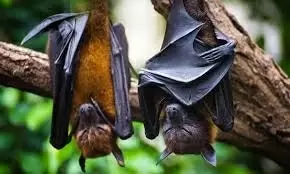Bat-related coronaviruses more frequent than thought: Study
15-September-2021

An average of about 400,000 people are infected with severe acute respiratory syndrome-related coronavirus (SARSr-CoVs) annually in South and Southeast Asia, according to a new study.
The study by researchers at Singapore's Duke-NUS Medical School and US-based non-profit EcoHealth Alliance showed that emerging diseases caused by coronaviruses of likely bat origin (for example SARS, Middle East respiratory syndrome, swine acute diarrhea syndrome coronavirus and Covid-19) have disrupted global health and economies for two decades.
New evidence, published on preprint server Medrxiv, meaning it has not been peer reviewed yet, suggests that acesome bat SARSr-CoVs could infect people directly, and that their spillover is more frequent than previously recognised".
"Each zoonotic spillover of a novel virus represents an opportunity for evolutionary adaptation and further spread; therefore, quantifying the extent of this 'hidden' spillover may help target prevention programmes," the researchers said.
For the study, the team derived biologically realistic range distributions for known bat SARSr-CoV hosts and quantified their overlap with human populations.
Using probabilistic risk assessment and data on human-bat contact, human SARSr-CoV seroprevalence, and antibody duration they estimated that about 400,000 people (median: about 50,000) are infected with SARSr-CoVs annually in South and Southeast Asia.
"These data on the geography and scale of spillover can be used to target surveillance and prevention programs for potential future bat-CoV emergence," the researchers said.
While the exact origins of the SARS-CoV-2, virus that caused Covid-19, remains unclear even after nearly 18 months, the disease likely emerged when a virus that infects horseshoe bats was able to jump to humans -- either directly through wildlife-to-human contact, or indirectly by first infecting an intermediate animal host, such as the pangolin.
Horseshoe bats have been known to carry a variety of coronaviruses, including strains that are genetically similar to ones that cause Covid-19 and SARS.
A study published in the open-access journal PLOS ONE in June showed that bats in Switzerland harbour viruses from 39 different viral families, and some have the potential to jump to other animals, including humans, and cause disease.
Another study, published in the journal Nature Food showed that China, Japan, the Philippines, and Thailand may transition into "hotspots" favourable for bats that carry coronaviruses and where conditions are ripe for the diseases to jump from bats to humans.
This is because of the global land-use changes including forest fragmentation, agricultural expansion and concentrated livestock production.- IANS
Khushbu Sundar’s X Account Hacked; Actress Seeks Urgent Help
ED Raids Bengaluru Dog Breeder Who Claimed to Own Rs 50 Crore Wolf-Dog
Raj Thackeray Slams Hindi Imposition in Maharashtra Schools, Warns of Statewide Protests
That Sassy Thing Raises ₹6 Crore to Disrupt Women’s Sexual Wellness Space
Suspended Kerala IAS Officer Prasanth Raises Promotion Demand During Hearing








